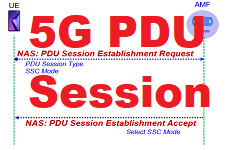Introduction
In 5G System, the one of the key task for the networ is to provide the connectivity to UE towards a Data Network (DN) know as 5G DNN which is similar to 4G APN. The Data Network (DNN) can be Internet, or an IMS or any other DNN dedicated to a Industry or Factory .
5G NAS-SM (Session Management) is responsible for setting up and managing the PDU session for user-plane connectivity between UE and Data Networks. The 3GPP specifications kept Session Management design flexible to support diverse 5G use cases e.g. Session Management supports different PDU Session protocol types, different options for how to handle session and service continuity, as well as a flexible User Plane architecture.
PDU Session Parameters:
A PDU session have following listed parmeters. A UE may request establishment of multiple PDU Sessions in parallel. This is useful in cases where a UE wants both Internet connectivity as well as IMS services at the same time as shown below.
- PDU Session Identifier: PDU Sessio ID is an identifier of the PDU Session at the UE and 5G network
- S-NSSAI (Slice identifier): Slice Identifier refers to the network slice in which the PDU Session is established
- DNN (Data Network Name): DNN is the name of the Data Network to which the PDU Session provides connectivity
- PDU Session Type: Types defines the end-user protocol carried by the PDU Session. It can be IPv4, IPv6, dual-stack IPv4/IPv6, Ethernet or Unstructured
- SSC Mode (Service and Session Continuity mode): SSC mode refer to the longevity of the User Plane anchor point of the PDU Session, whether it can be re-allocated or not
- User Plane Security Information: This indicates whether ciphering and integrity protection user-plane is to be activated for the PDU Session
PDU Session types
5G System supports following three PDU Session types to cover different potential use cases :
-
- IP PDU Session
- IPv4 PDU Session
- IPv6 PDU Session
- Dual-Stack IPv4v6
- Ethernet PDU Session
- Unstructured PDU Session
- IP PDU Session
While comparing with 4G EPS, we had IP based PDU Session types, indeed have similar properties also in 5GS, with some additional features for IPv6 in 5GS. Unstructured PDU Session type in 5GS is similar to non-IP PDN type in 4G EPS while Ethernet PDU Session type did not have any counterpart in 4G EPS initially but has later been added.
- IP based PDU Session: When it comes to IP, 5G System supports the same set of PDU Session types as 4G EPS i.e. IPv4, IPv6 and IPv4v6. However, especially for IPv6, more features like e.g. IPv6 multi-homing are supported for 5GS compared to EPS. As the name implies, these PDU Session types provide respectively IPv4, or IPv6, or both IPv4 and IPv6 services to the UE. PDU Sessions with PDU Session types IPv4, IPv6 and IPv4v6 can have any of the SSC modes 1, 2 or 3. It also support the full range of QoS features.
- Ethernet PDU Session: The Ethernet PDU Session is a new type of PDU Session in 5GS, carriers Ethernet frames between UE and the DN. The use of this PDU session type is to provide UE connectivity to a Lyaer 2 Ethernet Data network. An application for such PDU session where UE is connecting a remote office to a corporate network, or UE is an industrial device connecting to the LAN of a factory. Another application can be fixed wireless access service where a Residential Gateway is providing bridged Layer 2 services to a fixed wireless broadband customer. PDU Sessions with PDU Session type Ethernet may use SSC modes 1 or SSC modes 2 and SSC mode 3 is not supported.
- Unstructured PDU Session: When a PDU Session established with the Unstructured PDU Session type, 5G Core (5GC) does not assume any specific format for User Data. 5G Core basically treats the PDUs as unstructured bits and therefore has very limited possibility to do differentiated treatment of different traffic flows. The Unstructured PDU Session may be used to carry any protocol, also IP and Ethernet, but the primary application for this type of PDU Session is to support IoT protocols such as LoWPAN, MQTT, CoAP etc.
As 5G Core can not interpret the PDUs carried over Unstructured PDU Session, it also does not allocate any protocol addresses or other protocol parameters to the UE. Additionally, UE traffic can carried with single QoS flow as there is no mechanism to differentiate traffic within the PDU Session based on packet filters. This QoS flow shall be the default QoS class. The SSC mode 1 and SSC mode 2 is supported for PDU Sessions with PDU Session type Unstructured and SSC mode 3 is not supported.
References:
- 3GPP TS 23.501 5G; System Architecture for the 5G System
Related Post:
- SSC Modes – Session and Service Continuity in 5G
- 5G NAS Registration Reject Cause
- 5G NAS PDU Session Reject Cause Values and Reasons
- 5G Mobility Management Procedures – 5GMM
- 5G System Connection Management: CM-Idle and CM-Connected

